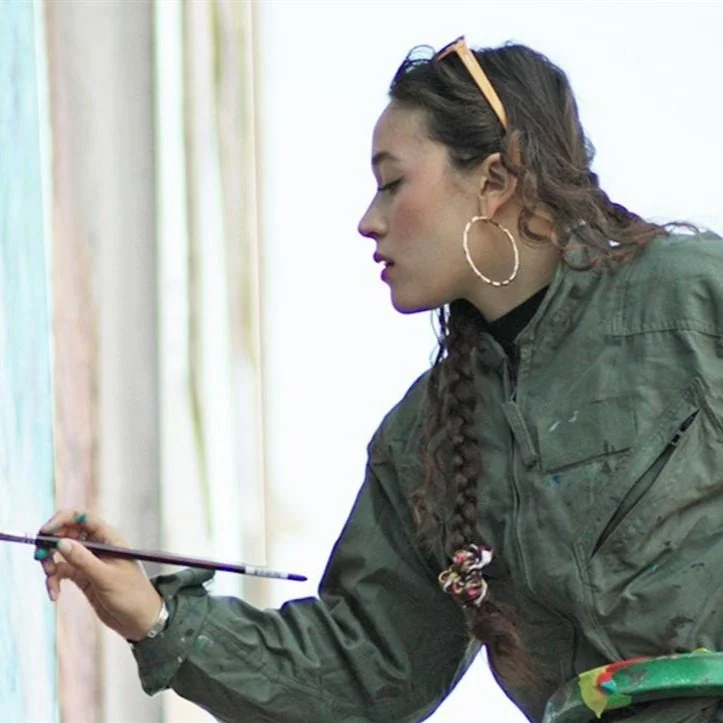6 Words to Let Go of Imposter Syndrome
June 11, 2023
For today’s newsletter, I want to focus on a topic from newsletter reader Patti G who asked, “What do you do when you feel intimidated and/or insecure in yourself?”
This is a great question and I would love to go a layer deep here and encourage you to do a 5-minute freewrite (prompts below). You know your circumstances better than anyone and trust me when I say you have more answers and wisdom than you realize. This is why I always advocate for freewriting in my class because it often leads to remarkable insight from students.
Why do you feel intimidated and/or insecure in yourself? Is it because you’re doing something new? Is it because you could be more prepared? Or is it because the systems in place have made you believe that you should feel intimidated and or insecure? These are nuanced emotions to navigate, so I invite you into this line of thinking.
If you are attempting something for the first time or if you are at the beginning of your journey, you might feel anxious and insecure because that is what it feels like to grow and be on a learning curve. But the hope is that, in time, you’ll gain confidence and mastery with practice, feedback, and by taking action.
So if you are at this stage in your life or process, know that it is natural and it is an opportunity to ask yourself: Is there anything I can do, within reason, that would prove to myself that I have earned the right to feel confident? Can you practice more? Can you get feedback from others? Try writing down a timeline for what you can accomplish in the next 2 weeks, 6 months, and year.
Let's say you’ve done all that. You are prepared, you’ve gotten feedback, and you have a plan, but you still feel intimidated and insecure. And let's say it’s not even your first time and you have every reason to feel confident — you are qualified and experienced and yet you still feel intimidated and insecure. Why? The answer might surprise you. To start: IT IS NOT YOUR FAULT.
Most call these gnawing feelings “imposter syndrome,” and this so-called syndrome has been a constant topic of conversation in my NYU class since I started teaching. The idea of imposter syndrome is a scourge.
The focus of this newsletter is to empower and provide resources for creatives, and in particular emerging artists, but at the end of the day, no “mindset” or set of resources alone is enough to combat being gaslit. That’s often what’s happening when feelings of “imposter syndrome” arise.
What made this all clear was watching Reshma Saujani’s 2023 Smith College commencement speech about releasing the burden of imposter syndrome (for women and people of color especially).
Reshma Saujani is an activist and founder of Girls Who Code, and I strongly encourage you to watch her full speech. But for the purpose of this newsletter I’ll highlight a few key quotes and ideas that I’m burning to share.
Saujani starts with a story:
“Back in the 1890s cycling was taking off in Europe and North America, especially for women. But just as the cycling craze reached a peak, doctors identified a never-before-seen medical malady, one that threatened to wreak “permanent havoc” on the female body.
It was called… bicycle face.
The new condition afflicted women who dared—gasp—go for a bike ride. And it came with a litany of supposed symptoms, from “flushed” cheeks and “bulging eyes” to “an expression either anxious, irritable, or at best…stony.”
That’s right: Before there was resting bitch face, there was resting bike face.
To be clear, it wasn’t just women riding bicycles. In fact, the majority of those taking up the hobby were men. But bicycle face was strictly a women’s disease. And that’s because it’s hard not to believe that bicycle face was invented purely to scare women away from their wheels.
It wasn’t a syndrome; it was a strategy.
In those days the bicycle was a symbol of a budding feminist movement. Women could go further, faster, without waiting around for a gentleman on horseback to come to their aid. Suffragists were able to meet up with one another and campaign from town to town. Women even started to demand different clothing, trading big hoop skirts for breezy bloomers.
To men, bicycles—and the behaviors they enabled in women—were a threat to the status quo. So they invented this disease to put women back in their place.
A century later, the idea of bicycle face sounds laughable. It’s easy to see it for what it is: a misogynistic scheme. But what if impostor syndrome is just a scheme too?”
In summary, Saujani says, “It’s never really been about whether we’re qualified enough, or smart enough, or prepared enough…. Instead, it’s always been about the political, the financial, the cultural barriers that are designed to keep us out of those rooms in the first place.”
She reveals that “imposter syndrome” is not something to fight against or conquer or overcome. It’s literally not anything, let alone a “syndrome.” It’s a strategy to keep certain groups of people from showing up and sharing their voices.
So what do we do about it? Saujani concludes, “The problem — and the solution — is bigger than any of us…. It’s not your job to fix yourself. But it is your job to fix the system.”
This made me think about one of my favorite movie moments: a scene from Jim Henson’s Labyrinth where Sarah (a teenage Jennifer Connelly) looks squarely at the seemingly invincible Jareth (David Bowie) and says, “You have no power over me” — to which Jareth completely loses his mind and his power starts to… dissipate and fade.
Reshma Saujani’s speech empowers us with the language to become our own Sarahs — the language to face the villains in our lives who have kept a stronghold on our confidence, authority, and agency.
Saujani’s words also reminded me of a recent WGA union meeting I attended where a writer made the profound observation that “[show] business is run on gaslighting.” The moment he said this everyone in the room (and there were thousands of us) collectively nodded. A truer statement has never been said about Hollywood.
The WGA Strike is a perfect example of Saujani’s closing remarks in action. It’s not up to individual writers to prove themselves “worthy” of fair wages. As a collective, it’s on us to call attention to and fix the broken system that’s denied inequitable wages and working conditions for a long time.
So the next time “Imposter Syndrome” (or Bicycle Face) creeps up on you, remind yourself that you are not a fraud. What you are more than likely experiencing is a number of societal barriers telling you to be “less than.” And it’s not on you to simply rise above those barriers — it’s on all of us to transform them.
Patti (and to all those who are wrestling with “imposter syndrome”), I hope this helps! May Reshma Saujani’s words inspire you to keep moving forward ❤️
You May Also Like…
“Time to Rally: The First Step to Supporting Yourself”
The entertainment industry historically has very little financial transparency, and as a result, most folks are in the dark as to how a person can make a living in the arts. So how does an emerging artist access opportunities that will eventually lead to a livable wage, consistent work, and ultimately “making it” (a.k.a. “supporting” themselves with their art)?
And for more on imposter syndrome, check out…
“Who’s The Real Imposter?” with Theodosia Arcidiacono
In this episode of Muse Monday hosted by Nia Farrell (Nine Muses Development & Production Director), actor and musician Theodosia Arcidiacono explains how imposter syndrome — an incredibly universal yet isolating feeling — is ultimately a distraction from following the paths that lead us to personal fulfillment.
Blair Imani’s “Smarter in Seconds” segment about the origins of “Imposter Syndrome.”
Imani writes, “It’s true that many people experience feelings of inadequacy and self-doubt HOWEVER the way this is usually discussed makes it seem like it’s a unique phenomenon that is specific to the person and that it must be overcome alone. In fact, there are a whole host of oppressive forces that both direct and indirectly tell us we do not deserve to accomplish things or that we will never achieve our ambitions—when we believe these constant messages we are told we have imposter syndrome as if it’s something self generated.”
Sign up for Bryce’s newsletter and be the first to receive Q&As, behind-the-scenes updates on all things BDH, insider tips for navigating the entertainment industry — and more!



